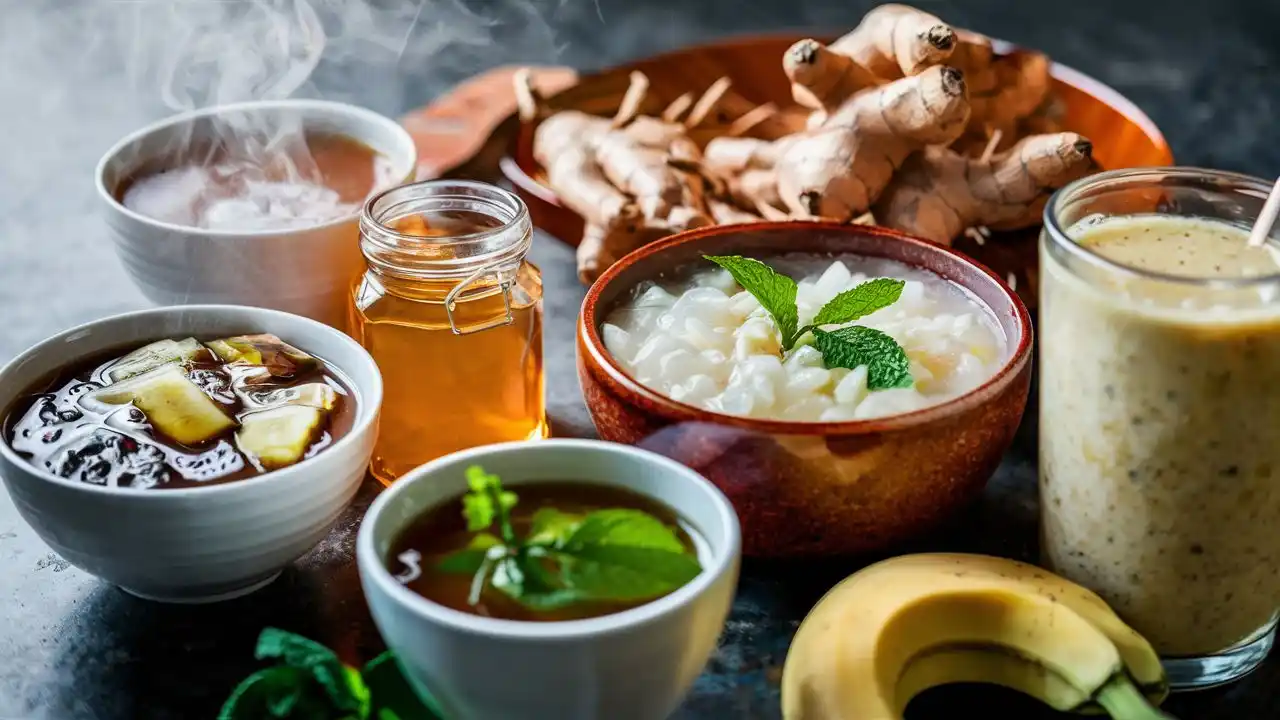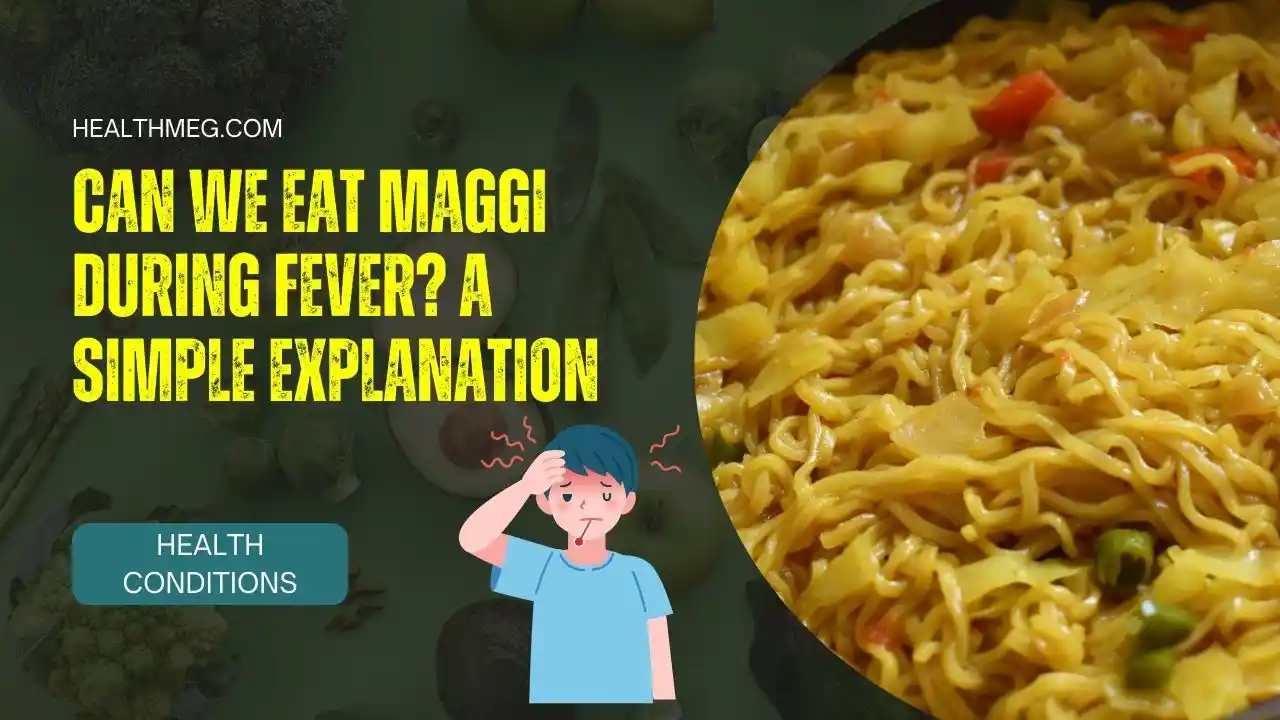Introduction
Eating the right foods when you have a fever is important to help your body recover. Many people wonder, “Can we eat Maggi in fever?” or “Can I eat Maggi in fever?” or they can eat any noodles in fever. In this article, we’ll explore if and when it’s okay to eat noodles during fever.
We analyzed the latest science on fever management and noodle nutrition to bring you a straightforward verdict on Maggi consumption when febrile. Read on to learn the research-backed effects of this cherished convenience snack during illness.
Let’s find out in-depth about the question – Can We Eat Maggi During Fever?
Do read the People Also Ask (FAQs) about this topic.
The Key Takeaway
| Key Takeaway | Explanation |
|---|---|
| Maggi in moderation is okay in the early stages of fever if you have an appetite | The MSG in Maggi could exacerbate gastrointestinal issues. |
| Maggi has a low nutrient density | It’s important to focus on hydration and add nutritious elements like vegetables or an egg for protein. |
| Avoid Maggi with prolonged, high fever (over 102°F/39°C) | Very high temperatures can affect gut function and cause electrolyte/fluid imbalances. |
| People with conditions like diabetes or IBD should consult a doctor | A doctor can provide dietary precautions related to fever and Maggi consumption. |
| Maggi has low nutrient density | To transform it into a nourishing, immunity-supporting meal, consider adding eggs, greens, and lean protein. |
| Maggi contains a lot of sodium | Excess sodium can worsen dehydration concerns and impact heart health. |
Can We Eat Maggi During Fever?
The Simple Explanation is Yes, you can eat noodles in moderation during a mild fever, but If you are experiencing nausea, vomiting, diarrhoea or abdominal pain along with fever, it’s better to avoid Maggi and bland foods like BRAT (bananas, rice, applesauce, toast). The MSG in Maggi could worsen these issues.
In the early stages of fever when you have an appetite, Maggi in moderation is unlikely to cause harm for most people. Focus on hydration and add vegetables or an egg for protein.
In prolonged high fevers (over 102°F or 39°C), it may be advisable to avoid Maggi. Very high temperatures can affect gut function and cause electrolyte/fluid imbalances. Stick to hydrating fluids and gentle, nutritious foods.
People with underlying health conditions like diabetes or inflammatory bowel disease should check with a doctor about dietary precautions to take with fever, including any special instructions regarding Maggi consumption.
What Happens to Your Body When You Have a Fever
Fevers indicate inflammation often from infectious causes like influenza or gastroenteritis viruses. Certain foods may ease or worsen a fever’s toll depending on nutritional content.
When fever strikes, here is what happens:
- Core body temperature elevates by 1-4° F, ramping up metabolism. This inhibits pathogen replication but also drains bodily resources. Energy expenditure and hydration needs rise sharply.
- Cytokines and prostaglandins released internally to fight infection also spark inflammation-related symptoms like headaches, body aches and appetite/thirst changes. Nausea, diarrhoea or constipation may also result.
- Cognitive function diminishes as the central nervous system responds immunologically. Fatigue sets in along with stimulatory discomforts.
In this already strained state, nutrition and hydration require careful support for recovery without overtaxing digestive organs.
Potential Drawbacks of Maggi Intake with Fever
However, experts also advise certain precautions around indulging in Maggi when febrile:
1. Low nutrient density
Standard Maggi packs minimal vitamins, minerals or proteins. It offers straightforward carbs and salts more so than well-rounded nutrition helping immunity. Adding eggs, greens, lean proteins and antioxidant-rich vegetables transforms basic Maggi into a more nutritious, immunity-supporting meal. Otherwise, it substitutes for components truly optimizing recovery potential.
2. High sodium content
A single Maggi cake contains 1,800 mg sodium, 75% of daily upper limits. Sodium causes water retention complicating fever’s dehydration concerns. Excess sodium also negatively impacts heart health. Look for low-sodium or no-salt-added varieties to cut this inflammatory mineral. Boost flavour with herbs and spices instead.
3. MSG and preservative content
Maggi seasoning contains controversial MSG-boosting umami allure but potentially provokes headaches or sensitivity issues in some folks. Preservatives like citric acid also get a bad rap, although data confirming toxicity remains inconclusive. Those avoiding additives may wish to prepare seasoning from scratch.
4. Fried variant risks
Popular regional fried Maggi iterations add inflammatory vegetable oils, thickening agents and additional sodium-amplifying drawbacks. Frying damages unstable oils creating irritating aldehydes and reducing nutrient quality. For fever, stick to classic soup or sautéed Maggi instead.
In general, listening to your body’s signals around comfort and tolerance guides best practice. Moderating portion sizes counteracts excessive carbs, sodium and additives. Seek whole food nourishment like broths, yogurt or fruit when appetite allows over relying solely on low-nutrient Maggi.
Alternatives to Maggi for Fever Relief

Beyond hydration and calorie replacement, certain traditional foods offer bonus nutrition and soothing powers helpful during fever recuperation. Consider these evidence-backed alternatives:
Ginger Tea – Anti-inflammatory gingerol compounds reduce fever and body aches. Can prevent nausea/vomiting also common with fever.
Honey Drink – Antimicrobial honey coats sore throats. Its light sweetness provides fast energy without taxing digestion like heavier foods. Contains immunity helpers like vitamin C.
Rice Congee – Rice gently nourishes without gut irritation. Natural starches aid hydration and electrolyte recovery. Easy to flavour and digest.
Mint or Tulsi Tea – Fibrous herbs soothe intestinal activity preventing diarrhoea. Anti-inflammatory compounds ease headaches, body pain and respiratory symptoms accompanying fevers.
Banana Smoothies – Cool, smooth texture appeals when chewing hurts. Provides electrolytes like potassium and magnesium to rehydrate.
Ultimately, no one food fixes all. Curating your fever food toolkit with a spectrum of items balancing science and personal preference works best.
Tips for Eating Healthy While You Have a Fever
Here are some tips to support your recovery:
- Stay hydrated with water, diluted juices, soups, and coconut water. Target several glasses per hour if the fever persists.
- Consume nutritious fruits and vegetables to replenish vitamins/minerals. Spinach, papaya, oranges, sweet potatoes, and carrots are great options.
- Eat small, frequent meals if you have appetite/nausea. Limit fat, oil and spice. Simple preparations are best.
- Chicken soup, vegetable broths, and rice porridge provide warmth, fluids and nutrients.
- Probiotic foods like yogurt, kefir or pickled vegetables can support gut health and recovery.
- Talk to your doctor if the fever lasts over 3 days (adults) or 1 day (children), or reaches over 104°F/40°C.
Conclusion
Consuming Maggi noodles in moderation is unlikely to pose any medical problems with mild fever without significant nausea or vomiting. However, it’s wise to focus on hydration and the gradual reintroduction of nutrition tailored to symptoms. For high fevers or when you are very nauseated, bland BRAT diet foods tend to be easier to digest.
The most important things are getting plenty of rest and supporting your body with fluids, electrolytes and gentle nutrition. Talk to your doctor if you have concerns during a fever. With their input, you can determine if and when Maggi consumption might be appropriate.
I hope this provides a helpful perspective on whether it’s advisable to eat Maggi noodles when you have a fever. Let me know if you have any other questions!
People Also Ask (FAQs)
Q) Can i eat maggi during fever
A) You can eat small amounts of plain Maggi in the early stages of a mild fever if you have an appetite. Skip it if your fever is high or you have gastrointestinal issues. Choose low-sodium varieties and enhance nutrition with veggies.
Q) Is it ok to eat maggi during fever
A) Yes, Maggi in moderation is okay in the early stages of fever if you have an appetite. Avoid it with prolonged, high fever over 102°F/39°C or if experiencing nausea, vomiting, diarrhoea.
Q) Can we eat noodles during fever
A) Yes, you can eat noodles in moderation during a mild fever, as long as you don’t have nausea, vomiting or diarrhoea. Focus on hydration and add nutritious toppings.
Q) Is noodles good for fever
A) Plain noodles can be good for fever if you have an appetite but no nausea, vomiting or diarrhoea. They provide carbs for energy. Balance with fluids and nutritious toppings.
Q) Can we have maggi during fever
A) Yes, you can eat Maggi in moderation during a mild fever if you have an appetite. Avoid prolonged high fever, nausea, vomiting, diarrhoea. Choose low-sodium and add vegetables.
Q) Is it okay to eat maggi in fever
A) Maggi in moderation can be okay in early stages of mild fever if you have an appetite. Skip with high fever, nausea, vomiting, diarrhoea. Focus on hydration and nutritious add-ins.
Q) Is maggi good during fever
A) Maggi lacks key nutrients for immunity but can be okay in moderation for mild fevers if you have an appetite. Tailor consumption to your symptoms.
Q) Can you eat maggi in fever
A) Yes, Maggi can be eaten in moderation during a mild fever if you have an appetite and no nausea. Avoid with high fever or gastrointestinal issues.
Q) Is maggi good when sick
A) Maggi can be okay when mildly sick if you have an appetite. It provides carbs for energy. Focus on hydration and boost nutrition with veggies, eggs etc.
Q) Can i have maggi during fever
A) Yes, you can have Maggi in moderation during a mild fever if you have an appetite and no nausea or diarrhoea. Skip with high fever.
Q) Can i eat maggi when sick
A) You can eat Maggi in moderation when mildly sick if you have an appetite. Avoid with high fever, vomiting, diarrhoea. Choose low-sodium and add veggies.
Q) Is maggi good in fever
A) Maggi can be okay in mild fevers in moderation with an appetite. It lacks key nutrients so focus on hydration and adding nutritious ingredients.
Q) Can i eat noodles in fever
A) Yes, you can eat noodles in moderation during mild fever if you have an appetite and no nausea/diarrhoea. Avoid with high fever.
Q) Can we eat noodles in fever
A) You can eat noodles in moderation during a mild fever if you have an appetite and no vomiting/diarrhoea. Focus on hydration and nutrition.
Q) Is maggi good for fever
A) Maggi lacks nutrients but can be okay in mild fevers in moderation if tolerated. Tailor intake to symptoms. Focus on hydration and nutrition.
Q) Can you eat maggi when sick
A) Yes, Maggi can be eaten in moderation when mildly sick if you have an appetite. Avoid with high fever, nausea, vomiting, diarrhoea.
Q) Can i eat instant noodles during fever
A) Yes, instant noodles can be eaten in moderation during mild fever if you have appetite and no vomiting/diarrhoea. Avoid with high fever.
Q) Should i eat maggi in fever
A) You can eat Maggi in moderation during mild fever if tolerated. Tailor intake to symptoms. Focus on hydration, rest and gentle nutrition.
Q) Can we eat instant noodles during fever
A) Yes, instant noodles can be eaten in moderation during a mild fever if you have an appetite and no vomiting/diarrhoea.
Q) Can we eat maggie in fever
A) Yes, Maggi can be eaten in moderation during mild fever if you have an appetite and no nausea/diarrhoea. Avoid with high fever.
Q) Can i eat noodles during fever
A) You can eat noodles in moderation during mild fever if you have an appetite and no vomiting/diarrhoea. Hydrate and add nutrition.
Q) Can i eat instant noodles when i have fever
A) Instant noodles can be eaten in moderation when you have a mild fever if you have an appetite and no vomiting/diarrhoea.
Q) Can we eat yippee noodles during fever
A) Yes, you can eat Yippee noodles in moderation during mild fever if you have an appetite and no nausea/diarrhoea.
Q) Can i eat maggi when i have fever
A) Yes, you can eat Maggi in moderation when you have a mild fever if you have an appetite and no vomiting/diarrhoea.
Q) Can i eat maggi with braces
A) Yes, Maggi can be eaten with braces in moderation. Avoid sticky, chewy varieties. Rinse mouth after eating to prevent food buildup.
Q) Is maggi good for sore throat
A) Maggi lacks key nutrients to heal sore throats. Warm broths, honey, ginger, garlic and turmeric better soothe sore throats.
Q) Can i eat maggi in cough
A) Yes, plain Maggi can be eaten in moderation with a cough. Spicy varieties may irritate. Focus on hydration and add soothing ingredients like honey.












